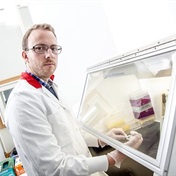A scientific journal has retracted a controversial paper claiming to have created the first human sperm from embryonic stem cells.
The journal's editor told the science publication Nature that the study by scientists at Britain's Newcastle University was retracted because two paragraphs in its introduction had been plagiarised.
Newcastle University blamed the plagiarism on a research associate who has left the institution, and said the science behind the research, and its conclusions, were not in question.
Experts said the plagiarism charge did not necessarily undermine the rest of the paper, though they acknowledged concerns might now be raised about the study's credibility.
Introduction paragraphs were plagiarised
The Newcastle scientists reported this month that they had
produced the sperm in a laboratory and that it could one day help
infertile men father children. Critics said the sperm did not have
the specific shape, movement or function of real sperm.
Graham Parker, editor of Stem Cells and Development, said on the journal's website that the sperm study "is being retracted," without explaining why. But the scientific journal Nature quoted him as saying that the introduction paragraphs were plagiarised. He did not say from where.
Experts said Parker was right to retract the paper.
"This is clearly scientific misconduct," said Allan Pacey, secretary for the British Fertility Society. "I can understand why people might think, if they were sloppy here, maybe they were sloppy elsewhere."
When the initial paper was published, Pacey said he was unconvinced the cells produced could accurately be called spermatazoa.
"It was bad enough to begin with, and now we've got another scandal to deal with," he said. Pacey said he was saddened, and thought the fallout might confuse the public further and hurt scientists' credibility.
Conclusions of research not questioned
The field of stem cell research has battled controversy before,
as when disgraced South Korean scientist Hwang Woo-suk claimed
falsely to have created human embryos from stem cells in 2004.
Karim Nayernia, who led the sperm research at Newcastle University, was unavailable to comment. But a statement released by the university blamed research associate Jae Ho Lee for the plagiarism, who has since left the university.
"No questions have been raised about the science conducted or the conclusions of the research," the statement said. It added that the paper will now be submitted to another academic journal and that Newcastle University will be further examining the supervision of research associates.
Elizabeth Wager, chairperson of the Committee on Publication Ethics, an international organization of publishers and editors, applauded the decision of Stem Cell and Development to retract the paper.
"This sets a line in the sand," she said. "Editors have a responsibility to correct the scientific record if misconduct has occurred."
Wager said the plagiarism charge was serious, but less worrisome than data fabrication. – (Sapa, July 2009)
Read more:
Human sperm created from stem cells




 Publications
Publications
 Partners
Partners










